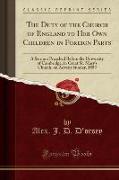- Start
- The Duty of the Church of England to Her Own Children in Foreign Parts: A Sermon Preached Before the University of Cambridge, in Great St. Mary's Chur
The Duty of the Church of England to Her Own Children in Foreign Parts: A Sermon Preached Before the University of Cambridge, in Great St. Mary's Chur
Angebote / Angebote:
Excerpt from The Duty of the Church of England to Her Own Children in Foreign Parts: A Sermon Preached Before the University of Cambridge, in Great St. Mary's Church, on Advent Sunday, 1859
The general argument of the chapter from which the text is taken may be brie¿y stated. When this pro phecy was delivered (about 590 years before the coming of our Lord), Jerusalem had been ruined, the Holy Land laid waste, and the chosen people, God's Flock, scattered or destroyed. The Lord is here represented as exercising his free grace, compassionating the stricken and oppressed, rebuking the negligence and rapacity of the rulers, promising that he himself will search and seek for the scattered ones, as a shepherd seeketh out his ¿ock, and pointing to the coming of the Mes siah, that plant of renown, under whose glorious reign the bands of their yoke shall be broken, resto ration to peace secured, and showers of blessings be their portion. The verse selected refers to the ¿ock as God's ¿ock, to its being scattered, and to the neg lect of duty by those whose office it was to search and seek after the sheep.
The Bible is replete with such illustrations: for to a pastoral people like the Jews of old, no images were more striking than those drawn in vivid freshness from their every-day life. The Sacred Record, in the very dawn of history, speaks of Abel as a keeper of sheep, while the Psalms and prophecies abound with figures and allegories, in which God's people are spoken of as the sheep of his hand and our Blessed Lord not only calls Himself the Shepherd of the sheep, but says to Peter, Feed my sheep. Still, though this is an illustration running through the whole of the Inspired Volume, it is not one that appeals with the same force to a modern as to an ancient audience, to an English as to a Jewish congregation. Our high-pressure age, our science and literature, our commerce and fine arts, our civilization and refinement, prompt a fastidious taste to crave for more highly-seasoned food, and to turn with contempt from the simple imagery of the Hebrew prophets. But with us, I know it is not so. We feel it good to let the mind go back to those early days, and dwell for a time where the shepherds of Israel fed their ¿ocks and to meditate on those sacred scenes from which shepherds returned, glorifying God. More especially should such associations be interesting to the Clergy, who can never forget that tender and beautiful passage from St John's Gospel, so filll of pas toral allusions, read in their hearing on the most solemn occasion of a Minister's career.
About the Publisher
Forgotten Books publishes hundreds of thousands of rare and classic books. Find more at www.forgottenbooks.com
This book is a reproduction of an important historical work. Forgotten Books uses state-of-the-art technology to digitally reconstruct the work, preserving the original format whilst repairing imperfections present in the aged copy. In rare cases, an imperfection in the original, such as a blemish or missing page, may be replicated in our edition. We do, however, repair the vast majority of imperfections successfully, any imperfections that remain are intentionally left to preserve the state of such historical works.
Folgt in ca. 15 Arbeitstagen
